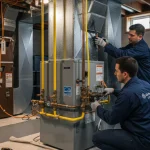Essential Information on How to Improve Air Quality in Your Home

Living in the city comes with a lot of complications. All the traffic, industrial smokestacks, and accumulated smog bring about air pollution. An average person spends around one-third of their day commuting or traveling to and from work. Little do they know that the outside air dramatically affects the air quality inside their homes, thus, contributing to indoor air pollution.
Indoor air pollution is a common problem among many households. A question frequently asked is, “How to improve air quality in house?” This article will discuss the essential information and what you can do to protect yourself and combat it.
What Is Indoor Air Pollution?
Indoor air pollution is when dust, gasses, or dirt inside any building, especially your home, may be harmful. Remember that the air you breathe can significantly affect your health and quality of life.
Poor indoor air quality in your home poses several health risks. This is because indoor pollution may be just as harmful as outdoor air.
Common Indoor Air Pollutants
Air pollutants are harmful to breathe in. Most people are not aware of some of the most common pollutants that can be found indoors. These often come in tiny particles that are difficult to clean. Some indoor air pollutants include the following:
- Carbon monoxide – This is formed when fuel is burned, such as a gas stove, cigarettes, or from vehicles.
- Dust mites – Commonly found in furniture such as sofas, carpets, and mattresses, dust mites may significantly trigger respiratory diseases.
- Pet danders – If you have pets that shed furs, such as dogs and cats, their pet dander may pollute the air quality of your home.
- Secondhand smoke – Similar to carbon monoxide, this can be produced by cigarette smokers, especially if they smoke indoors.
- Mold and mildew – Often formed in spaces with a lot of moisture and stale indoor air, including mold and mildew, can be major health hazards.
How to Improve Indoor Air Quality
Improving indoor air quality is easy. Practicing simple steps every day in your home can make a big difference. If you want to know how to reduce indoor air pollution or some practices you can do that do not necessitate you to spend a lot of money, read on.
Change Air Filters
This step is essential for homes with a working HVAC (heating, ventilation, and air conditioning) system. Air conditioning and heating systems affect the air quality inside, mainly through air ducts and air filters.
It allows you to feel comfortable all day at a regulated temperature while dealing with indoor air pollution. A good HVAC system has clean air filters; therefore, removing pollutants, cleaning, and changing your air filters should be your top priority.
Use Proper Ventilation And Air Conditioning
Proper ventilation is crucial, especially in areas of your house such as the kitchen, bathroom, and bedroom. Poor ventilation generates more air pollution, especially when the air is stagnant. Always use a kitchen exhaust fan, mainly when you use gas stoves that produce a lot of smoke. Both air conditioning and proper ventilation allow good air movement.
Air Out Your Home
In relation to proper ventilation, it is highly advisable to have good air circulation in your home. The air in your house or building needs to be released. You can do this when you open windows for natural ventilation. When your windows and doors are left open for most of the day, you can air out your home and let fresh air in. This may improve indoor air quality.
Buy Indoor Plants
Indoor plants can be considered natural air purifiers. They brighten up any space in your home, but more importantly, they improve the overall air quality. With house plants, you would not need to purchase artificial air fresheners. These are always a good and natural alternative to any chemically-made air cleaners.
Control Humidity
It is always important to control the humidity in your home. Humid air can create molds and mildew, especially in areas of your house with high moisture (i.e., bathrooms and basements).
If you want to spend less on dehumidifiers, you can always opt for simpler options for increasing ventilation. These can be through opening windows and utilizing air conditioning units.
Keep Rugs and Carpets Clean
Fine particles can be found in your rugs and carpets. These can trigger various allergy symptoms, especially if dust mites are accumulated in indoor spaces. It is ideal for cleaning your rugs and carpets every week. By doing so, you are on the right track to making your indoor air cleaner.
Invest In A Good Air Purifier
A good air purifier is better than other cleaning products. It can act as an air filter, protecting your home from harmful particles that you may breathe in. Air purifiers also allow a healthy airflow, which may benefit your breathing and overall health.
Some owners consider air purifiers that use essential oils for better enhancement, which is a good option for you to consider. You have to be careful because not all essential oils are good. It would be wise to consult experts before you make your purchase.
Health Benefits of Good Air Quality
You probably know by now that air pollution can bring a lot of health problems and put you and your family at a health risk. However, when you make a conscious effort to improve the air quality of your home, you will have fewer indoor air and health problems. It is ideal to breathe clean air as much as possible. The excellent air inside your home can bring about some health benefits, such as:
- Prevents asthma attacks and other respiratory diseases
- Reduces risk of lung cancer
- Lessens allergic reactions, especially to dust and small particles
- Eliminates the need for harmful chemicals, especially in cleaning products
- A safer home for the family
Good air quality can go a long way, significantly protecting against diseases. If outdoor air pollution can be too much to handle, you can always control the air quality within your home.
Final Thoughts
Your home needs to be safe from any type of air pollution, especially if they come from indoor or outdoor pollutants. Indoor air pollution is a common problem most households face, mainly because it happens daily. These problems can significantly affect your health and lifestyle, especially if you do not take the necessary steps to eliminate indoor air pollution.
A few indoor air pollutants include dust, pet dander or fur, carbon monoxide, and mold. You can combat air pollution by changing air filters, using proper ventilation, and buying indoor plants. You will be surprised how much these practices can benefit your overall health, especially when it comes to preventing allergies and asthma.
It is never too late to ensure the air quality is safe, clean, and hazard-free. What simple steps are you going to take to do so? As mentioned above, it does not need to be expensive. You just need to be mindful in your practice of improving your air quality.
Terms and Conditions
- Once an initial service has been completed, the customer will be on a one-year commitment
- After the initial 12 months, the contract will be renewed on a month-to-month cadence
- If a service is completed for the next year, it automatically renews the commitment for an additional year
- Customers can cancel at any time after the 12-month initial commitment as long as the following year’s service has not been completed.
- Customers need to provide 30 days written notice in order to cancel their plan




